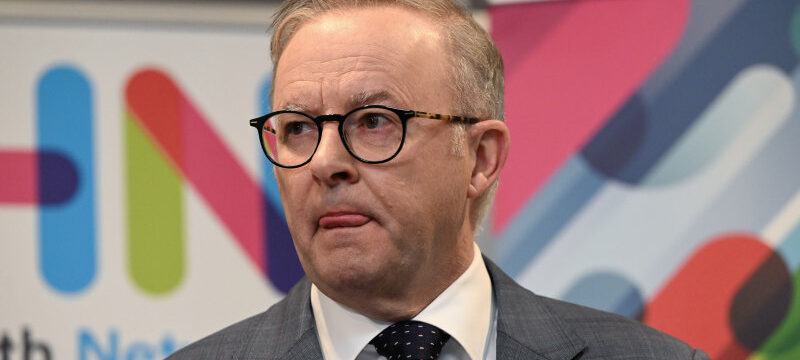Save articles for later
Add articles to your saved list and come back to them any time.
Key points
- The Reserve Bank of Australia expects rental inflation to continue rising in 2023, partly due to migration.
- Prime Minister Anthony Albanese says Labor will not revisit its negative gearing policy before the next election.
- The Greens claim Labor MPs are feeling pressure to adopt Greens housing policy including phasing out negative gearing.
- Reserve Bank minutes from its May board meeting show it is willing to keep raising interest rates.
Prime Minister Anthony Albanese has dismissed calls to reform negative gearing to address the housing crisis, as the Reserve Bank warned higher rents driven by strong population growth could drive up inflation and trigger further interest rate rises.
Opposition leader Peter Dutton and Greens housing spokesman Max Chandler-Mather both rounded on Albanese Tuesday. Dutton claimed the federal government planned to change the tax policy in the next term, while the Greens MP claimed government MPs wanted to back his party’s policies.
Prime Minister Anthony Albanese in Melbourne on Tuesday.Credit: Joe Armao
The RBA expects rental inflation to keep rising this year after recording the largest annual rise in 20 years of nearly 5 per cent through 2022, partially due to the recent bump in overseas migration. That will materially add to inflation, the board minutes said.
Albanese told reporters in Melbourne he would not revisit Labor’s negative gearing policy before the next election, despite calls from five Labor backbenchers to consider clawing back the tax break as part of a housing policy revamp.
“The government’s position is very clear, and it’s a position for which we received a mandate at the 2022 election – and I’m someone who keeps the commitments that we made,” Albanese said.
When asked about policy changes after the next election, Albanese listed a series of measures the government has announced to increase housing supply amid an affordability and rental crisis, including an extension of the Commonwealth State Housing agreement and increased rental assistance. He also called for the Greens and the opposition to vote for the $10 billion Housing Australia Future Fund, which is yet to pass the Senate.
“We’ll have more announcements on housing as we go forward. But we have very much a comprehensive plan. We want to implement that plan. And that’s my government’s proposal.”
In leaked talking points sent to Labor MPs by the prime minister’s office on Tuesday, MPs were told how to answer questions on “division on housing strategy” and the prospect of changes to tax concessions.
“We have no plans to change negative gearing rules, and don’t intend to reheat policies from the 2019 election,” the memo said. “Our focus remains on delivering what we promised the Australian people at the election.”
The Age and Sydney Morning Herald revealed on Tuesday that rank-and-file members of the Labor Party will push for a policy change at the national conference in August that would limit negative gearing to one property.
Five Labor MPs – Josh Burns, Jerome Laxale, Michelle Ananda-Rajah, Sharon Claydon and Graham Perrett – have variously raised concerns about tax breaks for investors, housing supply and the crisis in the housing market, signalling an appetite for a housing policy revamp.
Dutton seized on the hint of a change to the investor tax breaks – which Labor took to the 2016 and 2019 elections but then dumped – to claim the government planned to tackle them in the future.
“The prime minister went to an election promising that there would be no changes. If he’s proposing to change it, as Mr Chalmers is suggesting and his backbenchers are demanding, then we should have some honesty from the prime minister,” Dutton said.
Greens housing spokesman Max Chandler-Mather claimed that after sustained pressure, including while doorknocking Labor seats across the country, government MPs were feeling pressure to adopt his party’s housing policies.
“Now even Labor MPs and members are pushing for Labor to adopt the Greens housing policy including phasing out negative gearing,” he said.
As debate over housing policy erupted, minutes from the Reserve Bank’s May board meeting released on Tuesday showed it is willing to keep raising rates to rein in rent-fuelled inflation.
The Reserve Bank board surprised economists and financial markets on May 2 when it decided to lift the official cash rate by 0.25 percentage points to 3.85 per cent, the 11th interest rate rise in 12 board meetings.
“Strong population growth and low rental vacancy rates could also see rents grow even faster than the central forecast envisaged,” the minutes said.
Economists are divided about the impact that restricting the use of negative gearing to one property would have on the property market.
Some argue it would cramp investment in building homes, some of which would be rented, while others believe limiting the tax break would make it easier for Australians to buy their first home.
The RBA’s 11 rate rises have increased monthly repayments on a $600,000 mortgage by nearly $1400.
The bank’s board meeting minutes show members debated the “finely balanced” choice between lifting interest rates by 0.25 percentage points or holding them steady at 3.6 per cent at its May meeting amid a slowing economy and uncertainty.
“In weighing up the two options, members recognised that the arguments were finely balanced but judged it was appropriate to increase interest rates at this meeting,” the minutes said.
“Members also agreed that further increases in interest rates may still be required, but that this would depend on how the economy and inflation evolve.”
with Sumeyya Ilanbey
Cut through the noise of federal politics with news, views and expert analysis from Jacqueline Maley. Subscribers can sign up to our weekly Inside Politics newsletter here.
Most Viewed in Politics
From our partners
Source: Read Full Article

